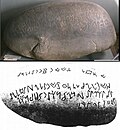topic of: Proto-Turkic Proto-Turkic is the linguistic reconstruction of the common ancestor of the Turkic languages that was spoken by the Proto-Turks before...
24 KB (1,660 words) - 15:30, 25 May 2025
Oguric languages (also known as Bulgar, Bulgharic, Bolgar, Pre-Proto-Bulgaric or Lir-Turkic and r-Turkic) are a branch of the Turkic language family....
10 KB (1,016 words) - 09:04, 9 May 2025
The Oghuz languages are a sub-branch of the Turkic language family, spoken by approximately 108 million people. The three languages with the largest number...
9 KB (837 words) - 18:41, 25 May 2025
Bulgar (also known as Bulghar, Bolgar, or Bolghar) is an extinct Oghur Turkic language spoken by the Bulgars. The name is derived from the Bulgars, a tribal...
21 KB (1,771 words) - 08:12, 24 May 2025
as parts of Europe, who speak Turkic languages. According to historians and linguists, the Proto-Turkic language originated in Central-East Asia, potentially...
198 KB (21,503 words) - 12:06, 30 May 2025
and West Asia. The Turkic languages originated in a region of East Asia spanning from Mongolia to Northwest China, where Proto-Turkic is thought to have...
97 KB (4,878 words) - 17:38, 1 June 2025
The Proto-Uralic homeland is the earliest location in which the Proto-Uralic language was spoken, before its speakers dispersed geographically causing...
34 KB (4,403 words) - 04:17, 26 May 2025
features are shared with other Common Turkic languages; others are unique to the Kipchak family. Change of Proto-Turkic *d to /j/ (e.g. *hadaq > ajaq "foot")...
7 KB (333 words) - 10:09, 1 June 2025
The Turkic languages are a group of languages spoken across Central Asia, West Asia, North Asia as well as Eastern Europe. Turkic languages are spoken...
41 KB (2,572 words) - 22:01, 28 April 2025
Oğuz (name) (category Turkish-language surnames)
and "z". In various modern Turkic languages and in Proto-Turkic language "ok(h)" means "arrow". Only in Proto-Turkic language, "ok" also means "clan", and/or...
3 KB (335 words) - 19:07, 5 May 2024
"dialects" as follows: Proto-Ainu Proto-Hokkaido–Kuril Hokkaido dialects Kuril dialects Proto-Sakhalin Sakhalin dialects The proto-language was reconstructed...
35 KB (3,414 words) - 21:58, 4 June 2025
Proto-Semitic Proto-Arabic Proto-Indo-European Proto-Anatolian Proto-Armenian Proto-Indo-Iranian Proto-Iranian Proto-Kartvelian Proto-Georgian-Zan Proto-Turkic Proto-Mongolic...
5 KB (366 words) - 04:26, 30 March 2025
branch of the Turkic language family. Evidence for the reassignment includes the preservation of the vowel length contrasts found in Proto-Turkic (PT), word-initial...
23 KB (1,787 words) - 23:06, 24 May 2025
The Altaic (/ælˈteɪ.ɪk/ ) languages are a group of languages comprising the Turkic, Mongolic and Tungusic language families, with some linguists including...
62 KB (7,088 words) - 23:01, 27 May 2025
Pan-Turkism (redirect from Pan-Turkicism)
debt". The pseudoscientific Sun Language Theory states that all human languages are descendants of a proto-Turkic language and was developed by the Turkish...
55 KB (6,497 words) - 18:18, 19 May 2025
question marks, boxes, or other symbols. Proto-Semitic is the reconstructed common ancestor of the Semitic languages. There is no consensus regarding the...
63 KB (6,241 words) - 02:33, 3 June 2025
Greek language, the family of Sarmato-Slavic languages (Russian, Polish, Czech, Dalmatian, Bulgar, Slovene, Avar and Khazar), the family of Turkic languages...
31 KB (3,676 words) - 17:59, 23 May 2025
Xianbei language, heavily influenced by the Proto-Turkic (later, the Lir-Turkic) language. The stages of historical Mongolic are: Pre-Proto-Mongolic...
31 KB (3,324 words) - 14:16, 30 March 2025
Proto-Samoyedic, or Proto-Samoyed, is the reconstructed ancestral language of the Samoyedic languages: Nenets (Tundra and Forest), Enets, Nganasan, Selkup...
14 KB (1,440 words) - 10:57, 13 May 2025
branch. All Indo-European languages are descended from a single prehistoric language, linguistically reconstructed as Proto-Indo-European, spoken sometime...
112 KB (10,365 words) - 22:18, 3 June 2025
Old Siberian Turkic, generally known as East Old Turkic and often shortened to Old Turkic, was a Siberian Turkic language spoken around East Turkistan...
29 KB (2,103 words) - 13:53, 25 May 2025
Bulgars (redirect from Proto-Bulgars)
Bulgars (also Bulghars, Bulgari, Bolgars, Bolghars, Bolgari, Proto-Bulgarians) were Turkic semi-nomadic warrior tribes that flourished in the Pontic–Caspian...
100 KB (11,482 words) - 23:33, 30 May 2025
Qarluq languages are a sub-branch of the Turkic language family that developed from the varieties once spoken by Karluks. Many Middle Turkic works were...
5 KB (325 words) - 02:45, 10 February 2025
The Siberian Turkic or Northeastern Common Turkic languages, are a sub-branch of the Turkic language family. The following table is based upon the classification...
6 KB (358 words) - 11:37, 7 April 2025
Volga Bulgaria (redirect from Volga Bulgar language)
wiktionary.org. 31 July 2021. Retrieved 2021-08-24. "Proto-Turkic/History of Proto-Turkic language – Wikibooks, open books for an open world". en.wikibooks...
51 KB (5,736 words) - 11:00, 3 June 2025
affricates, but Proto-Korean is reconstructed with a single set, like Proto-Japonic and Ainu, but unlike Tungusic, Mongolic and Turkic, which feature a...
57 KB (6,338 words) - 11:51, 6 May 2025
The Yakut language (/jəˈkuːt/ yə-KOOT), also known as the Sakha language (/səˈxɑː/ sə-KHAH) or Yakutian, is a Siberian Turkic language spoken by around...
62 KB (4,491 words) - 03:14, 11 May 2025
Oghuz Turks (redirect from Oghuz-Turkic)
Oghuz Turks (Middle Turkic: ٱغُز, romanized: Oγuz) were a western Turkic people who spoke the Oghuz branch of the Turkic language family. In the 8th century...
62 KB (5,976 words) - 00:19, 26 May 2025
more dominant languages, particularly Tungusic and latterly Turkic languages, that have largely displaced them. Even more recently, Turkic (at least in...
16 KB (1,129 words) - 04:37, 12 May 2025
Middle Turkic is a term used by linguists to refer to a group of Karluk, Oghuz and Kipchak languages spoken during much of the Middle Ages (c. 900–1500...
5 KB (465 words) - 22:02, 30 May 2025




















